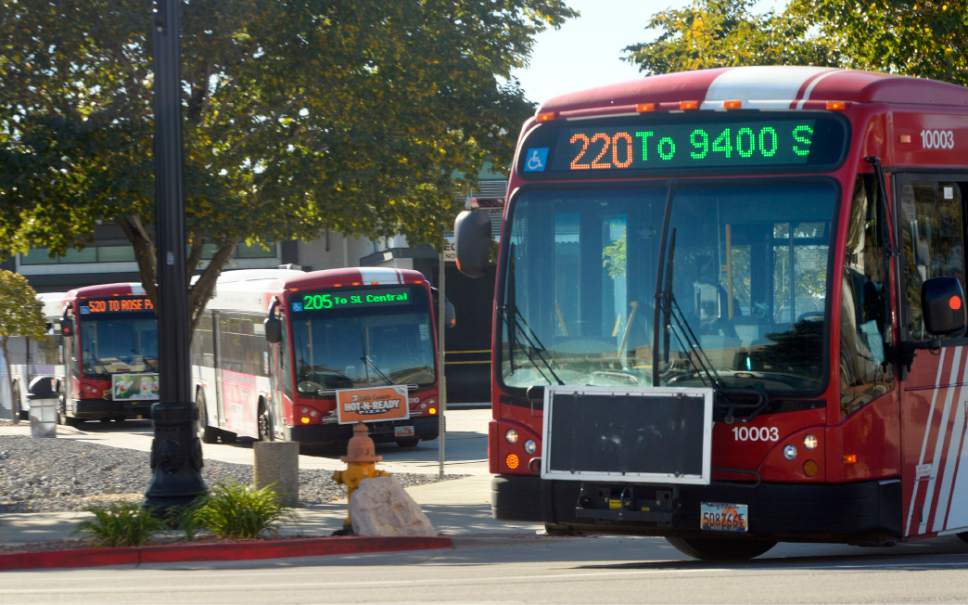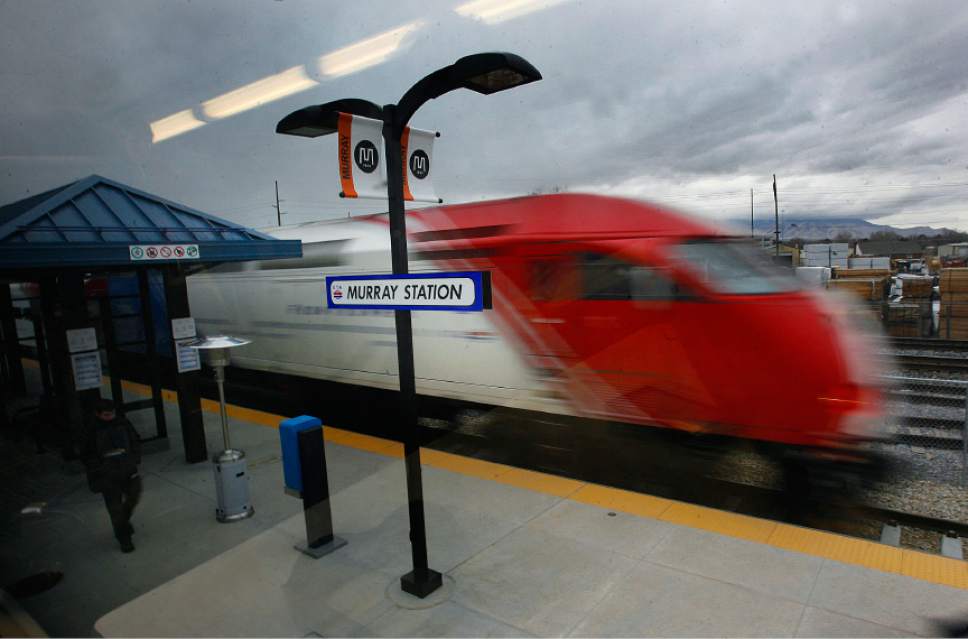This is an archived article that was published on sltrib.com in 2017, and information in the article may be outdated. It is provided only for personal research purposes and may not be reprinted.
A new state task force was deluged Wednesday with suggestions for what its co-chairman says may be "big major changes" coming for how transportation in Utah is governed and financed.
For example, Sen. Jake Anderegg, R-Lehi, offered several options to change oversight, including perhaps creating one state agency to govern both highways and transit. That is now split between the Utah Department of Transportation (for highways) and the Utah Transit Authority.
Anderegg also proposed that the scandal-tainted UTA perhaps be limited to handling just maintenance and operation of transit — and quit constructing new projects itself. He said engineers tell him the agency has spent perhaps twice as much as it should recently on new rail lines.
Others called for new incentives to improve transit ridership. Also, some officials sought state support for local transit. Others wanted changes in taxes, including finding ways to tax electric cars that now escape gasoline tax to help pay for roads.
Task force member Sophia DiCaro, a former state lawmaker, even suggested exploring whether money for transportation could be raised by leasing airspace above state freeways and roads for drones operated by delivery companies.
That came as the Transportation Governance and Funding Task Force — formed by the Legislature this year — spent several hours listening to ideas from the public.
"We are looking at some big, major changes possibly in the future, and we want to make sure we take the time to get it right," said Rep. Mike Schultz, R-Hooper, co-chairman of the task force.
Several speakers called for changes on how UTA is overseen, or how it operates.
Anderegg proposed several options, including perhaps requiring that UTA partner with a private company to run its buses and trains — which he says is done in some foreign countries to introduce competition and lower prices.
All the options he suggested also would take UTA out of the business of building new rail or other projects. He said foreign engineers told him they were astounded at the cost of UTA rail projects, and said their own similar projects cost only half as much. But he said UTA may have included the cost of train cars that others did not.
Anderegg said such options would probably make the state assume the $2 billion the UTA now has in debt for recent TRAX and FrontRunner projects.
George Chapman, representing the Utah Transit Riders Union, liked the idea of state absorbing UTA debt, saying it could free up UTA taxes to expand and improve service. He also called for a focus on buses instead of expensive new rail or bus rapid transit (BRT) systems to help hold down costs.
"Mass transit should first focus on the least expensive system: buses. Then when ridership develops, BRT and rail can be justified," he said.
Transit activist Alex Cragun urged the task force to prevent further involvement by UTA in transit-oriented developments. "UTA, in the public's eye, is about providing services of trains and buses, and not buying and selling land."
Some called for perhaps one state agency to oversee all transportation. Anderegg said that would help create a cohesive vision statewide.
Riverton Mayor Bill Applegarth sought state help to extend TRAX from South Jordan to Draper through his city. He said opposition on the City Council could block the project that would benefit several cities — so perhaps the state should be able to choose such routes itself, as it does with highways, without needing city permission.
Some also called for more state help for local projects.
Summit County Council member Roger Armstrong sought state subsidies for new commuter transit between Park City, the University of Utah and the Salt Lake City International Airport.
Chapman sought state help to pay for a proposed $68.5 million TRAX expansion at the airport. UTA has said it only has found about $10 million in funding. Chapman said the problem could be solved by changing laws to allow the airport to use airline passenger fees for such projects.
Several speakers urged more investment in transportation, and said it may take changes in taxes — including ways to tax electric cars that escape gasoline tax, or even leasing road airspace to delivery drones.
Officials from several cities also suggested that the state create financial incentives, but not mandates, for those that promote transit or walkable areas to reduce congestion and air pollution — perhaps giving a bigger share of taxes for those that take steps to allow higher-density housing near transit.
With the Wasatch Front projected to double its population in the next few decades, Anderegg said, "We're not going to build enough roads to handle the growth. … Transit has to be a solution."





